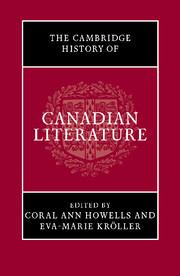Book contents
- Frontmatter
- Introduction
- PART ONE OLD AND NEW WORLD, LA NOUVELLE-FRANCE, THE CANADAS, DOMINION OF CANADA
- PART TWO THE POST-CONFEDERATION PERIOD
- PART THREE MODELS OF MODERNITY, POST-FIRST WORLD WAR
- 13 Staging personalities in modernism and realism
- 14 E. J. Pratt and the McGill poets
- 15 The 1940s and 1950s: signs of cultural change
- 16 The Centennial
- 17 Forms of non-fiction: Innis, McLuhan, Frye, and Grant
- PART FOUR AESTHETIC EXPERIMENTS, 1960 AND AFTER
- PART FIVE WRITING IN FRENCH
- Bibliography
- Index
- References
16 - The Centennial
from PART THREE - MODELS OF MODERNITY, POST-FIRST WORLD WAR
Published online by Cambridge University Press: 28 September 2010
- Frontmatter
- Introduction
- PART ONE OLD AND NEW WORLD, LA NOUVELLE-FRANCE, THE CANADAS, DOMINION OF CANADA
- PART TWO THE POST-CONFEDERATION PERIOD
- PART THREE MODELS OF MODERNITY, POST-FIRST WORLD WAR
- 13 Staging personalities in modernism and realism
- 14 E. J. Pratt and the McGill poets
- 15 The 1940s and 1950s: signs of cultural change
- 16 The Centennial
- 17 Forms of non-fiction: Innis, McLuhan, Frye, and Grant
- PART FOUR AESTHETIC EXPERIMENTS, 1960 AND AFTER
- PART FIVE WRITING IN FRENCH
- Bibliography
- Index
- References
Summary
In 1967, Canada celebrated the 100th anniversary of Confederation and to mark the occasion, Montreal staged an international exhibition on two islands in the St. Lawrence, the Île St.-Hélène and the Île Notre-Dame. Expo 67 was to become the most successful of its kind in the twentieth century, praised for a “sophisticated standard of excellence [that] almost defies description.” Described as “a multi-sensory total-environment poem,” Expo brought millions of Canadians and international visitors to a city said to possess such “verve and panache” that citizens from the more remote regions were carefully coached in the media on how to measure up to the place. A microcosm of global competition, most notably between the United States and the Soviet Union and their satellites, an encyclopedia of the latest technological developments, and a compendium of 1960s popular culture, ranging from the campy exhibits of the United States to a “color-splashed display of Carnaby Street’s mad-mod styles” in the British pavilion, Expo 67 was also a unique opportunity to see important collections of art both traditional and modern, for which participating nations had all but ransacked their museums. The effect on Canadian visitors and artists was profound.
- Type
- Chapter
- Information
- The Cambridge History of Canadian Literature , pp. 312 - 334Publisher: Cambridge University PressPrint publication year: 2009
References
- 1
- Cited by



